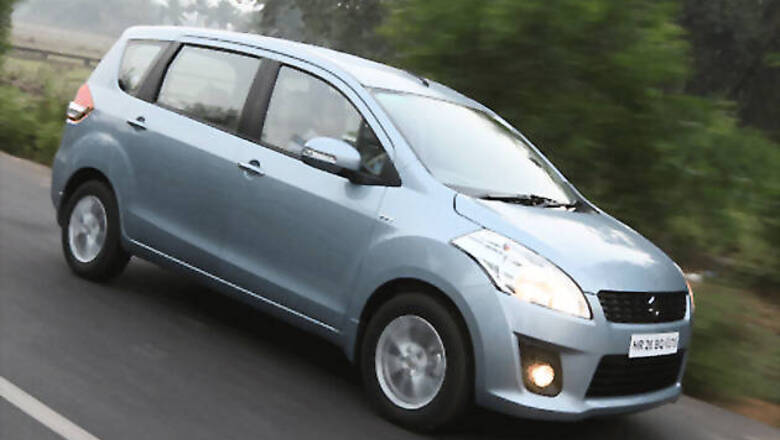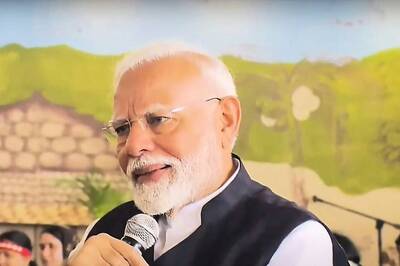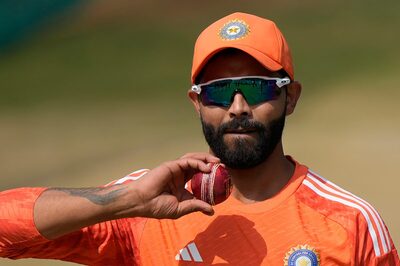
views
Shooting in the dark requires skill. You need to be an excellent archer, have the right equipment and at the same time hope that your guess about the position of the target is bang on. The Ertiga was Maruti Suzuki shooting in the dark. Surely they must have had reams and reams of research data to back this new product.
Surely they can firmly claim to have their finger on the pulse of the Indian automobile customer but still the element of risk, however miniscule, of the Ertiga becoming a Kizashi would have crossed their mind.
But now, having received about 32,000 bookings in the first month after its launch, India’s most preferred automobile brand can pat themselves on the back for having created a new segment. One where now there will be a flurry of activity from the other manufacturers trying to play catch up.
We have already put a magnifying glass to the Ertiga when we drove it in Goa during the unveiling of the car to the media and came back impressed with the product or more to the point with the relevance of the product in today’s market. But we wanted to get a feel of how it feels like to live with the Life Utility Vehicle (LUV). Here are our observations.
Two things have played a key role in the success of the Ertiga. The competitive pricing and the familiarity card. We will come to the price later. The design of the Ertiga, as we have said in our first drive report, is one which doesn't polarise opinion. 'No marginalisation' is the motto of the design people at Maruti. The front has the Ritz look mated to the Swift head lamps.
When you look at it head on, you won't be able to make out that it’s a seven-seater. And that becomes a drawback when you are out driving on the road. We took it for a couple of trips to Pune and on the expressway the sight of an Ertiga in the rear view mirror is not intimidating enough for the vehicle in front to move aside. It doesn’t look like a seven-seater unless you look at it from the side where the length gives it away.
Step inside and the Swift interiors greet you. Taking away the all-black theme and replacing it with the black and beige theme has helped increase the feeling of space. This is where Maruti have played the familiarity card well. The Swift customer looking to upgrade will have no problem adapting to the Ertiga’s interiors. Even my mom, the last possible expert on anything to do with automobiles, said that the inside looked similar to the Swift we had for a while (Of course she didn’t know it was called the Swift).
This observation was made by my mom when the Ertiga was being used to ferry my sister and her three-month-old bundle of joy to her place. The entourage included, apart from me, three women, one uber energetic five-year-old and three month’s worth of baby 'equipment'.
So apart from the baby the rest of the configuration could be what, on an average, you can expect an Ertiga to handle. And it was a perfect fit. The kid went in the third row with his toys and the 135-litre boot was used to hold two duffel bags.
Two adults sat in the middle row but a third adult would have been a bit of a squeeze. The journey was comfortable with the air-con vents in the roof, above the front row of seats providing ample cooling.
The only complaint I have is that, even in the top-end variant of the Ertiga, you get knobs for the air con instead of the automatic climate control available in the Swift and Dzire. So overall, interiors that feel similar to the Swift and offer the same high level of comfort. And a layout that doesn’t need getting used to.
Now let’s get behind the wheel. The first thing that you notice is the high driving position. It feels like a Swift on stilts. In fact if it weren’t for this high position you could have safely assumed that you were in a Swift or a Dzire. That is until you look back and see the rear windscreen a little farther away than you would expect.
This car-like feel is evident even when the vehicle is on the move, especially when you push the Ertiga into a corner. The heavy steering provides you with the required feedback and the planted feel of the vehicle doesn’t give you the sense of it being a MUV.
The suspension is softer than the hatchback, translating into a plusher rider over bad roads with only a marginal increase in body roll. Within the city the Ertiga feels nimble and again, it’s the car-like feel which helps you steer it with ease through traffic (the 5.2-metre turning radius helps) but the only catch is that you have to keep reminding yourself that, even though it’s not as big as other MUVs, it’s not exactly a small vehicle.
Under the hood the Ertiga sports the 1.3-litre DDiS engine from the SX4. It also comes with a new K14B petrol engine – 95PS of power at 6000rpm and 130Nm of torque at 4000rpm but petrol vehicles currently are only for Arab sheikhs and Rajnikanth (insert suitable joke here).
So back to the diesel which produces 90PS of power at 4000rpm and 200Nm of torque at 1750rpm. It comes with a variable geometry turbocharger which helps in reducing lag.
Below 2000rpm, especially in higher gears, you can feel the delay but that doesn’t mean you get bad responses when the pedal is pushed. It pulls away in most gears, except for some reluctance in the fifth. But in the city traffic especially, the power delivery is more than enough to overtake that irritating rickshaw or the cabbie driving in the fast lane.
The Ertiga reaches the three figure mark in 13.33 seconds which is quite quick for its size, especially when you compare that time to the 14.24 seconds of the SX4 and the 14.98-second time of the Dzire. It did a top speed of 169.13kmph in our test which again is more than its siblings (SX4 – 165kmph, Dzire – 162kmph).
And despite this burst of speed it also returns a fuel efficiency of 13.20kmpl in the city and an impressive 21.25kmpl on the highway giving it an overall figure of 15.21kmpl. That would be just what the doctor ordered for the MUV segment – a healthy combination of power and fuel efficiency.
Now the price. Maruti have always been aggressive with the pricing and the Ertiga toes the line. With the top-end diesel variant, ZDi, that we tested being available for Rs 8.45 lakh, ex-Delhi, Maruti have managed to present the Ertiga as a strong alternative to those looking to graduate from a hatchback to a sedan.
It offers you the extra third row - for two energetic kids and also retaining the car-like feel which will make the transition from a hatch easier. It’s at home on both the highway and the city traffic.
Add to that the frugality of the engine and the aggressive pricing means that the current six-month waiting period isn’t going to come down any time soon.




















Comments
0 comment